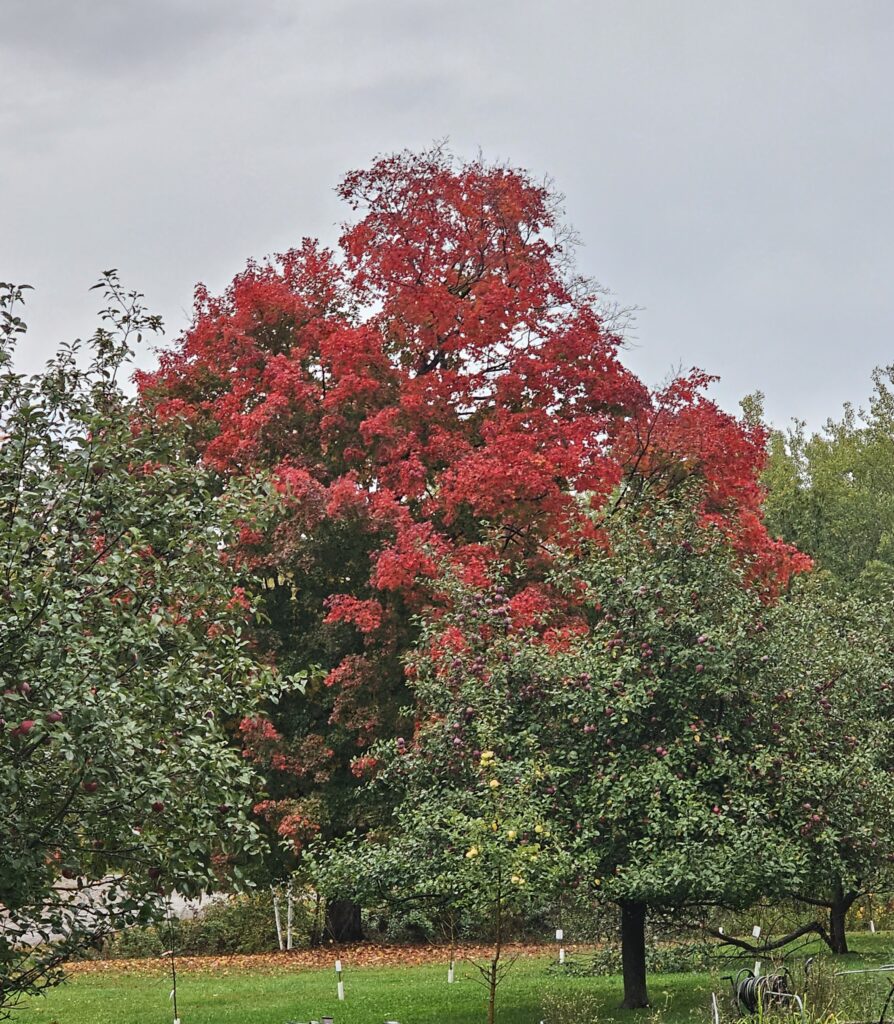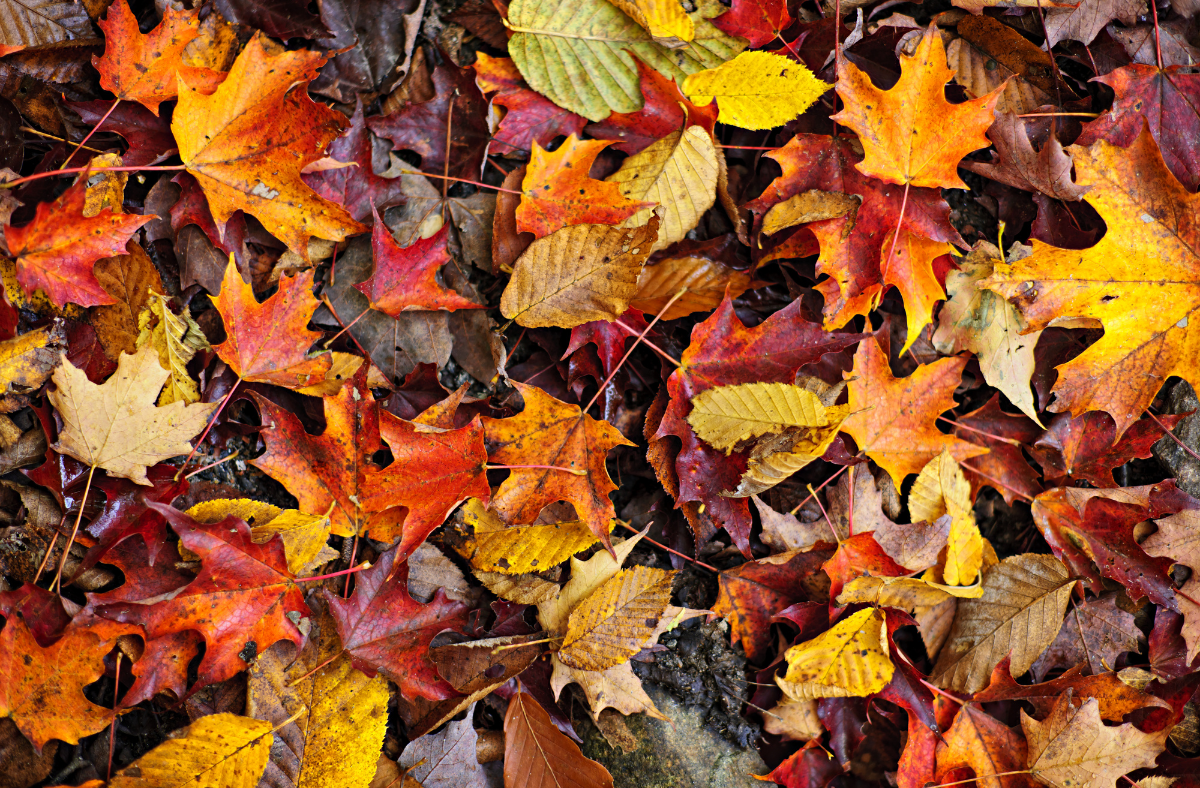Fall Leaves Are Beneficial
You may find yourself with an abundance of leaves from your trees, however, fall leaves are beneficial in many ways. If you have trees that lose their leaves every fall, you’ll want to read these tips. Let me share my favorites ways to use them.
IMPORTANT: Just make sure that you do not spray any of your trees with anything considered not organic, if you are wanting to be organic. If you spray any sort of pest control on the leaves or tree it is no longer organic leaves to be used in organic gardening.
9 Ways to Use Your Fall Leaves
The top 3 on this list are how make sure my fall leaves are beneficial.
1. Mulching: Spread a layer of leaves around the base of trees, shrubs, and other plants to help insulate their roots and retain moisture. My favorite things to Mulch are my garlic and asparagus beds. Then I use my tomato cages laid on the leaves to keep them from blowing away.
2. Soil amendment: Shred, chop up fallen leaves or leave them whole and till into the soil. Incorporating them into garden soil will increase its organic matter content and improve its structure. We Cover our garden every fall with a thick layer of all the leaves that have fallen in our yard.
3.Composting: Fallen leaves make an excellent addition to a compost pile, adding nutrients and helping with decomposition.
4. Landscaping: Use colored leaves to add interest to garden beds or as ground cover in areas where plants do not grow.
5. Wildlife habitat: Pile up leaves in a corner of your yard to create a cozy shelter for small animals and insects during the colder months.
6. Fun for kids: Jumping in piles of leaves is a classic autumn activity that never gets old.
7. Decorations: Use leaves to create crafts or decorations for Halloween, Thanksgiving, or other fall holidays.
8. Insulation: Use leaves to insulate a porch, a cold frames or other garden structures to help extend the growing season.
9. Fire-starting: Dried leaves make excellent kindling for starting fires in wood stoves or fireplaces.
Which Leaves Are Safe - Compost & Garden?
Most tree leaves are safe to compost in your garden, including maple, oak, ash, beech, birch, and poplar leaves.
These leaves are rich in nitrogen and other essential nutrients and provide an excellent source of organic matter for the soil.
However, it is recommended to avoid composting leaves from certain trees, such as eucalyptus, black walnut, and poison ivy, as they contain chemicals that can harm plants or humans.
Additionally, it is essential to shred or chop the leaves before adding them to the compost pile to speed up decomposition and prevent matting.
Composting tree leaves is an excellent way to recycle your yard waste and create nutrient-rich soil for your garden at the same time.
Collecting - Fall Leaves Are Beneficial
There are several ways to collect fall leaves:
1. Rake the leaves up into piles and use a leaf blower to blow them into a pile. Then pick up and distribute them.
2. Use a leaf vacuum or a lawn sweeper to collect the leaves. This is what we do then we drive into the vegetable garden and dump them.
3. Mow over the leaves using a “mulching lawn mower” to chop them up and leave them on the lawn as fertilizer.
4. Use a tarp to drag the leaves to your garden or your spot used for composting.
Mulch - Fall Leaves Are Beneficial
Using tree leaves as a mulch offers several benefits to gardeners and farmers.
First, it helps to retain soil moisture by acting as a protective cover over the soil. This means that water is less likely to evaporate, which can be especially helpful in dry climates or during times of drought.
Second, it helps to suppress weed growth, as it blocks sunlight from reaching the soil and the weed seeds.
Third, as tree leaves decompose, they add nutrients to the soil, providing a slow-release fertilizer that can support plant growth.
Fourth, it can provide habitat for beneficial insects and organisms that help to maintain a healthy soil ecosystem.
Finally, it is a low-cost (free) and eco-friendly alternative to other types of mulch, as it can be easily collected and processed onsite.
Garden Soil - Fall Leaves Are Beneficial
Adding tree leaves to your garden soil each year can have several benefits.
Firstly, as the tilled in leaves decompose, they release important nutrients back into the soil, such as nitrogen, phosphorus, and potassium.
Secondly, this can help to improve soil fertility, which in turn leads to better plant growth and health.
Thirdly, leaves also help to improve soil structure, making it lighter and crumbly, and improving aeration and drainage.
Finally, when leaves are incorporated into the soil, they provide habitat for a wide range of beneficial microorganisms, which can help to improve soil health and diversity.
Overall, adding tree leaves to your garden soil each year can help you to create a thriving, healthy ecosystem that supports a diverse range of plant and animal life.
Final Thoughts

This big Maple tree and several apple and pear trees help to contribute to the mulch for my garlic and asparagus beds and the vegetable garden too.
We have all deciduous trees (leafy) all around our property, so we have plenty of beneficial fall leaves.
I highly encourage you to try some of these options if you haven’t. It’s a much better option than what some towns or cities off for leaf removal.
I also love that in the fall is when we plant garlic for the next year. And it is so convenient that the perfect mulch is falling leaves at the same time. They really help to keep the weeds back while the garlic gets off to a great start.
For more Organic Gardening Tips
*Highlighted text contains links. Some links commissions are earned. If you choose to purchase from these links, thank you for your support! Your purchases help us to continue to offer more free content.

Share via: